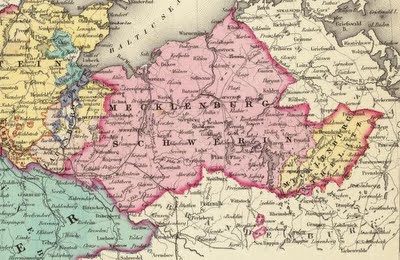Entry #8
Johann “John” Schatz and Friedrika Schwern emigrated from Bützow in the Grand Duchy of Mecklenburg-Schwerin to Cincinnati, Ohio, leaving their homeland on May 16, 1854, and arriving in New York on July 3, 1854. Johann traveled on the ship Sir Robert Peel with Friedrika, their infant child, Carl, and Wilhelmine Schatz, who is listed on the Hamburg Passenger List as Johann’s sister. Johann and Friedrika were my great, great-grandparents. Johann and Friedrika were listed on the ship’s passenger list as farmers and on the Hamburg Passenger Lists as an “arbeiter” or worker. This, combined with the fact that they were unmarried, yet had a child, speaks volumes about their social status in Mecklenburg. Johann and Friedrika were peasants, most likely impoverished ones, at that.
Mecklenburg had some of the worst living conditions in Western Europe during the 1800’s. A primitive feudal system, which began soon after the close of the Thirty Years War and lasted until 1820, put serfs at the mercy of the noble landowners. Most peasants were landless, but even those with property usually had obligations to the large estate owners; they were often required to work the landlord’s fields as well as their own. Carol Gohsman Bowen notes that the landless peasants were entirely dependant on the nobles who could even buy and sell them with or without their property. In 1820, serfdom was abolished. Rather than improving the lot of the peasants, economic conditions became worse. Landowners were no longer responsible for the support of their workers, as meager as it had been. Peasants who were old or physically unable to work were dismissed and many former serfs roamed from place to place as itinerant day workers. Further, a couple needed the permission of the local nobility to marry and that came under the condition that the man be able to prove that he could support a wife and family. On her website, Understanding Your Ancestor’s Life, Leslie Albrecht Huber reports that after 1820 nearly twenty percent of Mecklenburg births were illegitimate.
(More about the history of Mecklenburg from the sources cited is available here and here.)
Most likely Johann Schatz was not able to receive permission to marry Friedrika and their eldest son, Carl (Charles), was born out of wedlock. Marrying seems to have been one of the first orders of business for John and Friedrika after establishing themselves in Cincinnati. They married there on September 4, 1854, just two months after arriving in the United States.
It would be easy to romanticize why my Mecklenburg ancestors came to this land, but it is just as likely that the reasons were economic as much as for love. Once in the United States, Johann permanently became John. He began to earn a living as a farm worker, but soon operated a small dairy on Delhi Pike in Sedamsville, part of the 21st Ward of Cincinnati. My mental picture of John is that he may have been hard-headed and difficult to get along with, especially if you were his neighbor. It seems that John was inclined to dispose of his cow manure by shoveling it into Boldface Creek, and habit that landed him in Court in 1874. His neighbors H.J. Wipper, Oliver Champlin and F.G. Frohmeyer sought an injunction against him for his practice. The creek, they claimed, had insufficient flow at certain times of the year to remove the filth and the stench created a nuisance that prevented their enjoyment of their homes. They further alleged that the dairyman was now deliberately allowing the waste to accumulate on his property since the suit began, implying that my great, great-grandfather was deliberately acting with retribution in mind. John testified that he kept from 30 to 50 cows in such a way as to provide healthy and clean milk to his customers; nevertheless, the court found for the plaintiffs and ordered John to dig a tank on his land, line it with brick or stone, cover it, and cement it so that its contents would not escape into the creek. The offal was to be placed in the tank on a daily basis. (Tuesday, December 15, 1874; paper: Cincinnati Daily Gazette (Cincinnati, OH); page: 3.)
Two years later, John Schatz became the plaintiff against a man named Patrick Bean in an attempt to recover damages from an accident in which the horse from his milk wagon was killed and one of his sons injured. John believed that Bean had caused the accident by stringing a line across the road. The verdict was found in favor of the defendant, but a week later my ancestor was back in court with charges of bribery against the defendant. Those charges were not sustained, but two of the jurors were found to be disreputable and a new trial was granted. I have not yet learned the outcome of the retrial.
John and Friedrika raised eight children to adulthood, including my great-grandfather, Henry, who was the youngest of the brood. I believe that the land that had been John’s dairy is the same place my dad refers to as “the farm” where he lived as a child. John Schatz must have felt very empowered to be a landowner who could sue and be sued after beginning life as a peasant in Meckelnburg! John Schatz died on May 4, 1899.

very good one! I am happy I could inspire you 😉 this blogposts of mine touches the illegitimate births in Mecklenburg further: http://schmidtbarbara.wordpress.com/2014/01/26/52ancestors-no-4-a-family-or-not/
Thanks! Your insight on the illegitimate births is very helpful.
[…] the June 1870 census, where he was accurately recorded as being 8/12ths of a year. His parents were John Schatz and Friedrike Schwenn Schatz, and I have already written about them at […]